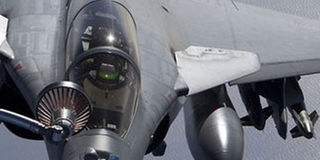Nato troops launch air strikes on Gaddafi

A Rafale jet of the French army being supplied as it takes part in military operations in Libya. Libyan rebels have criticised Nato in recent days, accusing the alliance of failing to protect the population in Misrata. Photo/FILE
Benghazi, Sunday
Nato launched air strikes against Libyan leader Muammar Gaddafi’s troops in the stricken port city of Misrata on Sunday after regime forces killed at least 11 people there at the weekend, rebels said.
And in Brussels, an alliance official confirmed to AFP that Nato warplanes had destroyed 11 regime tanks on the road to the eastern Libyan town of Ajdabiya and another 14 tanks near Misrata.
On the diplomatic front, a high-ranking African Union delegation was on its way to Libya on Sunday to present a blueprint for a ceasefire.
Rebels said they had captured 15 Algerian mercenaries and killed another three during fierce fighting in Ajdabiya the previous day.
Medics also said at least 12 rebels were killed in and around Ajdabiya over the weekend.
Officials at Benghazi’s Jala hospital said it had received nine “martyrs” from the fighting and 14 wounded people, and a doctor at the Al-Hawwara hospital said it had received three dead and three wounded.
A marked improvement
The air strikes on Misrata came on Sunday morning, a rebel spokesman in the besieged town told AFP, describing the raids as “a marked improvement in Nato intervention.”
“They began the raids yesterday on the Gaddafi forces in the northwest of the town and near the centre of Misrata,” said the spokesman.
“In the morning, there were new raids but we are not able to verify the targets,” he said, adding that eight rebels were killed by pro-Gaddafi forces and 22 others were wounded on Saturday.
A doctor at Misrata hospital gave AFP the same death toll for Saturday, saying they included civilians, while putting the number of wounded at 25.
The doctor said the hospital had received three bodies on Sunday, two rebels and a civilian, adding that it was possible there could be more fatalities at other medical facilities.
“As of noon today, Nato air strikes have taken out 11 tanks on the road to Ajdabiya and strikes will continue through the day and tonight,” a Nato official in Brussels told AFP on condition of anonymity.
“Clearly the situation in Ajdabiya is desperate and Gaddafi forces are attacking the town with heavy weapons,” the official said.
Loud explosions rocked the battleground town of Ajdabiya for a second day on Sunday, as rebel fighters advanced cautiously after suffering a major reverse at the hands of loyalists.
The alliance had already taken out 15 tanks near Misrata on Friday and Saturday, bringing to 29 the total number of tanks destroyed around Libya’s third largest city in the past three days.
Western strikes against regime forces began on March 19 under a UN mandate to protect the population after Gaddafi unleashed his security forces to quell pro-democracy protests.
The United States handed control of the operation to Nato on March 31. Libyan rebels have criticised Nato in recent days, accusing the alliance of failing to protect the population in Misrata.
Picking up the pace
But Nato says it is picking up the pace of air strikes. Meanwhile, African Union mediators left Mauritania for Libya, where they were to attempt to negotiate a ceasefire.
Presidents Mohamed Ould Abdel Aziz of Mauritania, Amadou Toumani Toure of Mali, Denis Sassou Nguesso of Congo and Jacob Zuma of South Africa, left in mid-morning and were travelling separately to Tripoli, and then on to the opposition stronghold of Benghazi.
“They have just left, each in his own plane,” an official Mauritanian source told AFP.
The delegation also includes Ugandan Foreign minister Henry Oryem Okello, representing Yoweri Museveni, the fifth head of state making up the AU panel.
Earlier on Sunday, the mediators reiterated their appeal for “an immediate end to all hostilities” and proposed a transition period to adopt reforms in the insurrection-hit country.
They were due to meet Gaddafi in Tripoli and leaders of the rebellion in Benghazi.
Rebel spokesman Shamsiddin Abdulmolah told AFP in Benghazi that 18 men they captured near Ajdabiya were not carrying identification, but “they said they were Algerian and they had Algerian accents”, adding that they would be shown in public later in the day.
“They were claiming to be selling hashish... and they had hashish with them. This is the whole crazy thing about it,” he said.
He also said several Algerian ID cards and passports were found in a nearby building in Ajdabiya.
Abdulmolah said the group of 18 were led into the frontline town by a local resident allied with Gaddafi’s regime, who was also captured, adding that all the detainees were being treated well.
He accused Algeria of backing Gaddafi and of “turning a blind eye” to the mercenaries flowing into Libya.
The rebels have long accused Gaddafi of deploying hired guns from Chad and Niger against them.




